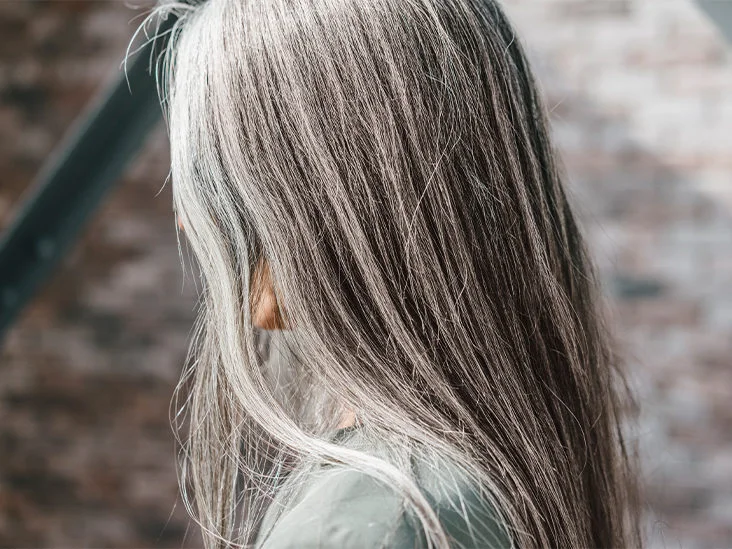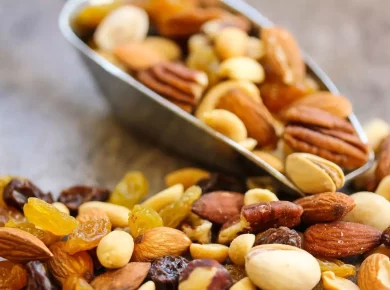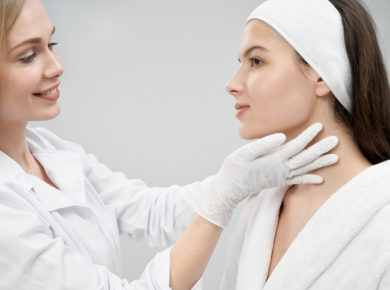White hair is a natural part of the aging process, but it can also occur prematurely due to various factors. Here are some common causes of white hair:
Genetics:
Your genes play a significant role in determining when your hair starts turning gray or white.
Genetics plays a significant role in determining when your hair turns gray or white. Your hair color is determined by the amount and type of melanin, a pigment produced by specialized cells called melanocytes in the hair follicles. As we age, the melanocytes gradually produce less melanin, leading to a loss of hair color and the appearance of gray or white hair.
The genes that control hair color are passed down from parents to their offspring. Some people may start to develop gray or white hair at a young age, while others may not experience it until later in life. The exact timing of hair color change can vary widely among individuals, depending on their genetic makeup.
While you cannot change your genetic predisposition to gray or white hair, adopting healthy habits such as eating a balanced diet, managing stress, and avoiding harsh hair treatments may help delay the onset of premature graying.
Age:
As you get older, your body produces less melanin, which gives your hair its color.
Age is one of the most common causes of white hair. As we age, the melanocytes in our hair follicles gradually produce less melanin, the pigment that gives our hair its color. This leads to a loss of hair color and the appearance of gray or white hair.
The age at which we start to develop gray or white hair can vary widely among individuals. Some people may start to notice gray or white hair in their 20s or 30s, while others may not experience it until their 50s or later.
While it is not possible to stop the natural aging process that causes white hair, adopting healthy habits such as eating a balanced diet, exercising regularly, and managing stress may help slow down the process or delay the onset of premature graying.
It’s important to note that having gray or white hair does not necessarily indicate poor health or aging. It is a natural part of the aging process, and many people embrace their gray hair as a sign of wisdom and experience.
Also Read: wellhealthorganic.com:belly-fat-9-best-ayurvedic-remedies-to-reduce-belly-fat
Nutritional Deficiencies:
A lack of certain nutrients, such as vitamin B12 and iron, can lead to premature graying.
Nutritional deficiencies can also be a cause of premature graying or white hair. Hair follicles require a variety of vitamins and minerals to produce healthy hair and maintain its natural color. Deficiencies in these nutrients can lead to hair loss, thinning, and premature graying.
Some of the key nutrients required for healthy hair include:
- Vitamin B12: Helps maintain healthy hair follicles and prevents premature graying.
- Vitamin D: Helps regulate hair growth and prevents hair loss.
- Iron: Necessary for healthy hair growth and helps prevent hair loss and premature graying.
- Zinc: Helps maintain healthy hair follicles and prevents hair loss.
- Copper: Helps produce melanin, the pigment that gives hair its color.
- Biotin: Helps produce keratin, a protein that makes up the structure of the hair.
If you suspect that nutritional deficiencies may be contributing to your white hair, it’s important to talk to your doctor or a registered dietitian. They can help identify any nutrient deficiencies and recommend dietary changes or supplements to help support healthy hair growth and maintain its natural color.
Stress:
Stress can affect your hair’s pigmentation by depleting melanin production.
Stress can also be a contributing factor to premature graying or white hair. When we are under stress, our bodies release a hormone called cortisol. High levels of cortisol can affect the function of melanocytes in the hair follicles, leading to a loss of hair color and the appearance of gray or white hair.
In addition to affecting hair color, stress can also contribute to hair loss and thinning. When we are under stress, the body may redirect nutrients away from the hair follicles and toward other vital organs and functions, leading to weaker and thinner hair.
Managing stress is an important part of maintaining overall health and may also help prevent premature graying or white hair. Some stress management techniques include exercise, yoga, meditation, deep breathing, and spending time in nature. It’s important to find what works best for you and make stress management a regular part of your self-care routine.
Also Read: wellhealthorganic.com:5-herbal-teas-you-can-consume-to-get-relief-from-bloating-and-gas
Smoking:
Smoking damages hair follicles and can lead to premature graying.
Smoking is another factor that can contribute to premature graying or white hair. Cigarette smoke contains harmful chemicals that can damage hair follicles and affect melanin production. This can lead to a loss of hair color and the appearance of gray or white hair at an earlier age.
Smoking can also contribute to other hair-related issues, such as hair thinning and hair loss. The chemicals in cigarette smoke can weaken hair follicles and impede blood flow to the scalp, which can result in weaker and thinner hair.
Quitting smoking is an important step in preventing premature graying or white hair and maintaining overall hair health. It may take some time for the effects of smoking to reverse, but quitting smoking can improve blood flow to the scalp and support healthy hair growth. If you are struggling to quit smoking, talk to your healthcare provider about strategies and resources to help you quit.
Here are some natural ways to prevent white hair:
- Eat a balanced diet: Eating a diet rich in nutrients such as vitamin B12, iron, and folic acid can help prevent premature graying.
- Manage stress: Practicing stress-relieving activities such as meditation and yoga can help prevent premature graying.
- Quit smoking: Quitting smoking can help prevent hair damage and premature graying.
- Use natural hair care products: Using natural hair care products can help prevent damage to your hair and scalp.
- Massage your scalp: Massaging your scalp can improve blood circulation to the hair follicles and promote healthy hair growth.
- Use hair masks: Applying natural hair masks, such as coconut oil or amla powder, can help nourish and strengthen your hair.
Remember, while there is no guaranteed way to prevent white hair, incorporating these natural methods into your lifestyle can help maintain healthy hair and prevent premature graying.
Also Read: wellhealthorganic.com:health-benefits-and-side-effects-of-oil-of-oregano
How to stop causes of white hair
White hair is a natural part of the aging process, but premature graying can be caused by various factors, such as genetics, nutritional deficiencies, stress, smoking, and certain medical conditions. While it is difficult to completely stop the causes of white hair, there are some steps you can take to slow down the process or prevent premature graying. Here are some tips:
- Eat a healthy and balanced diet: A diet rich in vitamins and minerals can help prevent premature graying. Foods such as leafy greens, nuts, and fish are good sources of nutrients that can help promote healthy hair.
- Manage stress: Chronic stress can lead to premature graying, so it’s important to manage stress through relaxation techniques such as yoga, meditation, or deep breathing exercises.
- Quit smoking: Smoking can cause oxidative stress, which can damage hair follicles and lead to premature graying. Quitting smoking can help prevent further damage and promote healthy hair growth.
- Get enough sleep: Lack of sleep can lead to stress and other health problems that can contribute to premature graying. Aim to get at least 7-8 hours of sleep every night to help promote overall health and well-being.
- Avoid harsh hair treatments: Chemical treatments such as hair dyes, perms, and straightening treatments can damage hair and contribute to premature graying. Limit the use of these treatments or avoid them altogether.
- Use natural hair care products: Natural hair care products can help nourish and strengthen hair, reducing the risk of damage and premature graying. Look for products that contain natural ingredients such as aloe vera, coconut oil, or henna.
- Exercise regularly: Regular exercise can improve overall health and promote healthy hair growth by increasing blood flow to the scalp.
Remember, while these steps may help slow down the causes of white hair, it is a natural part of the aging process, and everyone will eventually experience it. Embrace your natural hair color and focus on maintaining healthy hair rather than trying to stop the inevitable.
Conclusion
In conclusion, there are several factors that can contribute to white hair or premature graying. These include genetics, age, nutritional deficiencies, stress, and smoking. While some of these factors cannot be controlled, adopting healthy habits such as eating a balanced diet, managing stress, and quitting smoking can help support healthy hair growth and delay the onset of premature graying.
It’s important to note that having gray or white hair is a natural part of the aging process, and there is nothing inherently unhealthy or unattractive about it. Many people embrace their gray hair as a sign of wisdom and experience. However, if you are experiencing white hair at a young age or are concerned about your overall hair health, it’s important to talk to your doctor or a qualified healthcare provider. They can help identify any underlying health issues and recommend strategies for maintaining healthy hair.
Also Read: wellhealthorganic.com:diet-for-excellent-skin-care-oil-is-an-essential-ingredient
FAQ
Q. What causes white hair?
A. The causes of white hair can be genetic, age-related, nutritional deficiencies, stress, smoking, and certain medical conditions.
Q. How can I prevent premature graying?
A. You can prevent premature graying by eating a healthy and balanced diet, managing stress, quitting smoking, getting enough sleep, avoiding harsh hair treatments, using natural hair care products, and exercising regularly.
Q. Can natural remedies prevent white hair?
A. Natural remedies such as amla powder, coconut oil, and other hair masks can help nourish and strengthen hair, but they may not completely prevent white hair.
Q. Is white hair reversible?
A. White hair is a natural part of the aging process, and it is not reversible. However, you can slow down the process or prevent premature graying by adopting healthy habits.
Q. Are there any medical treatments for white hair?
A. There are no medical treatments specifically for white hair. However, some medical conditions that can cause premature graying may be treated with medication.















